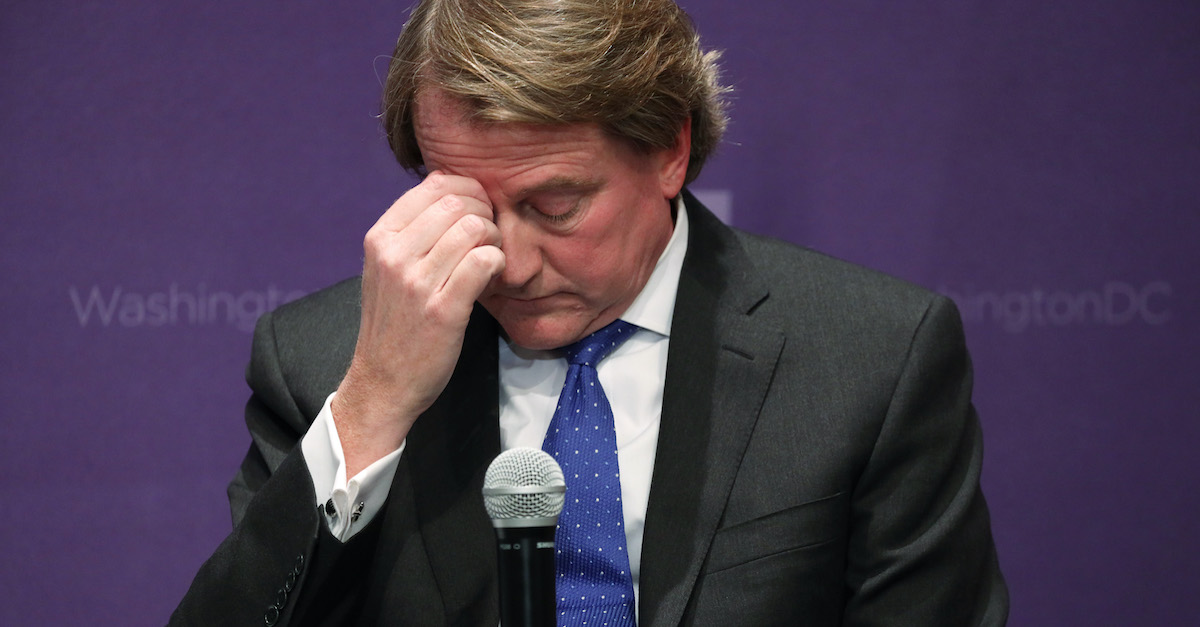
The full U.S. Court of Appeals for the District of Columbia Circuit, in a 7-2 decision on Friday, said that Congress has standing to seek enforcement of subpoenas issued to former White House counsel Don McGahn—a figure whose testimony Democrats have argued could lead to additional impeachment charges against the president.
Chief Judge Sri Srinivasan and Circuit Judges Karen LeCraft Henderson, Judith Rogers, David Tatel, Merrick Garland, Thomas Griffith, Patricia Millett, Cornelia Pillard, and Robert Wilkins took part in the decision. Notably, Trump-appointed Circuit Judges Gregory Katsas and Neomi Rao did participate in the case.
Rogers penned the opinion of the court, while Griffith and Henderson each wrote dissents. The D.C. Circuit decided to rehear the case en banc in March—after Griffith and Henderson decided the DOJ was right to argue Article III of the Constitution forbade federal courts from “resolving this kind of interbranch information dispute.” The panel dismissed the case 2-1. Rogers dissented.
On Friday, Rogers spoke for the full D.C. Circuit.
“The question before the en banc court is whether the Committee on the Judiciary of the House of Representatives has standing under Article III of the Constitution to seek judicial enforcement of its duly issued subpoena,” Rogers wrote. “Upon applying the principles of Article III standing, we hold that it does.”
Democrats have long-sought to obtain McGahn’s testimony about his time in the White House and conversations with President Donald Trump that he described to former special counsel Robert Mueller; their theory (or hope) is that McGahn will offer up a smoking gun that supports the claim that the president obstructed justice. McGahn infamously said that Trump ordered him to orchestrate the firing of the special counsel amid the quickly ramping up Russia probe.
Here’s what the Mueller Report said about why McGahn told the special counsel this:
The President also asked McGahn in the meeting why he had told Special Counsel’s Office investigators that the President had told him to have the Special Counsel removed. McGahn responded that he had to and that his conversations with the President were not protected by attorney-client privilege. The President then asked, “What about these notes? Why do you take that he keeps notes because he is a “real lawyer” and explained that notes create a record and are notes? Lawyers don’t take notes. I never had a lawyer who took notes.” not a bad thing. The President said, “I’ve had a lot ofgreat lawyers, like Roy Cohn. He did not take notes.
The three-part Article III standing test requires that the plaintiff demonstrate an “injury in fact” if a lawsuit is to move forward:
1) The plaintiff must have suffered an “injury in fact,” meaning that the injury is of a legally protected interest which is (a) concrete and particularized and (b) actual or imminent
2) There must be a causal connection between the injury and the conduct brought before the court
3) It must be likely, rather than speculative, that a favorable decision by the court will redress the injury
Circuit Judge Rogers, mentioning the impeachment power, said that Congress demonstrated it “suffers a concrete and particularized injury” redressable by the court:
The Constitution charges Congress with certain responsibilities, including to legislate, to conduct oversight of the federal government, and, when necessary, to impeach and remove a President or other Executive Branch official from office. Possession of relevant information is an essential precondition to the effective discharge of all of those duties. Congress cannot intelligently legislate without identifying national problems in need of legislative solution and relying on testimony and data that provide a deeper understanding of those problems, their origins, and potential solutions. It likewise cannot conduct effective oversight of the federal government without detailed information about the operations of its departments and agencies. And it cannot undertake impeachment proceedings without knowing how the official in question has discharged his or her constitutional responsibilities.
The Committee, acting on behalf of the full House of Representatives, has shown that it suffers a concrete and particularized injury when denied the opportunity to obtain information necessary to the legislative, oversight, and impeachment functions of the House, and that its injury would be redressed by the order it seeks from the court. The separation of powers and historical practice objections presented here require no different result. Indeed, the ordinary and effective functioning of the Legislative Branch critically depends on the legislative prerogative to obtain information, and constitutional structure and historical practice support judicial enforcement of congressional subpoenas when necessary.
In closing, Rogers kicked “[c]onsideration of McGahn’s other contentions — including threshold pre-merits objections that there is no subject matter jurisdiction and no applicable cause of action, and potential consideration of the merits if reached” back down to the panel to “address in the first instance.”
Read the rest of the D.C. Circuit opinion (and dissents) below:
D.C. Circuit en banc McGahn… by Law&Crime on Scribd
[Image via Alex Wong/Getty Images]